Unit 13 We’re trying to save the earth!Section A (1a-2d) 课件(30张PPT)
文档属性
| 名称 | Unit 13 We’re trying to save the earth!Section A (1a-2d) 课件(30张PPT) | 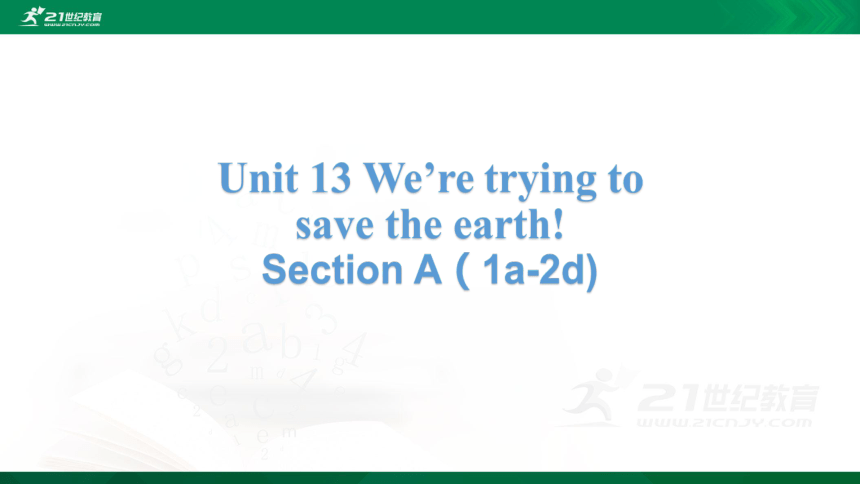 | |
| 格式 | pptx | ||
| 文件大小 | 15.5MB | ||
| 资源类型 | 试卷 | ||
| 版本资源 | 人教新目标(Go for it)版 | ||
| 科目 | 英语 | ||
| 更新时间 | 2021-02-05 21:11:30 | ||
图片预览


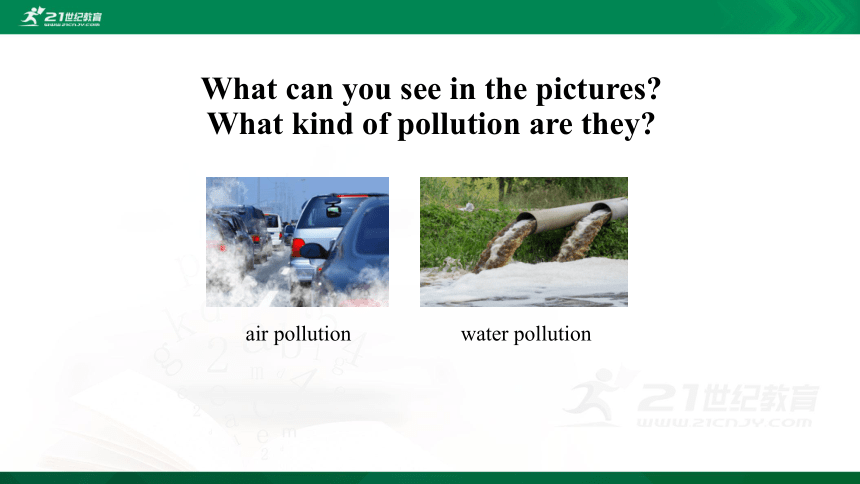
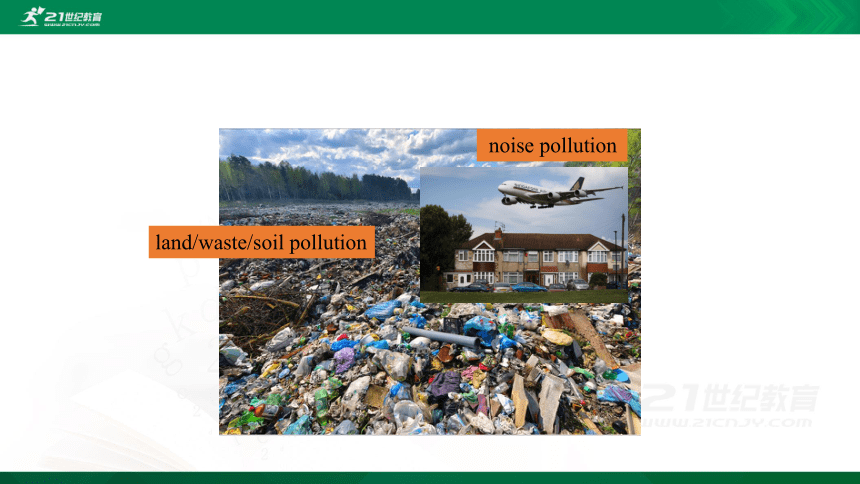
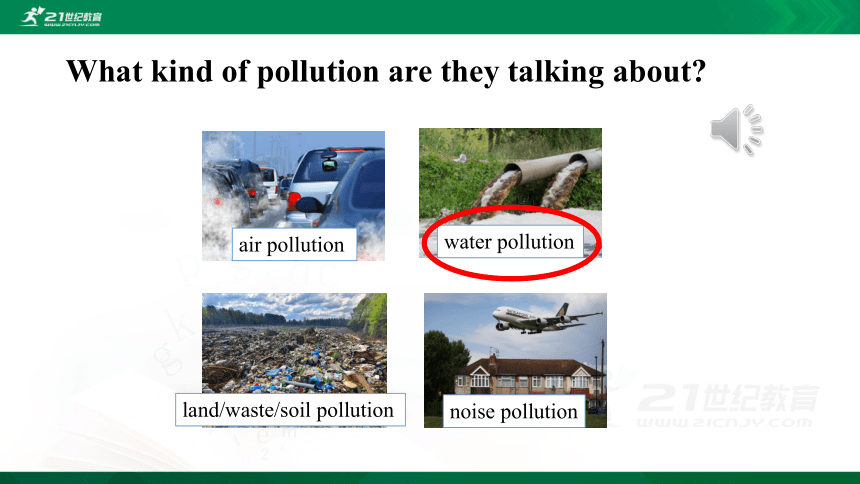
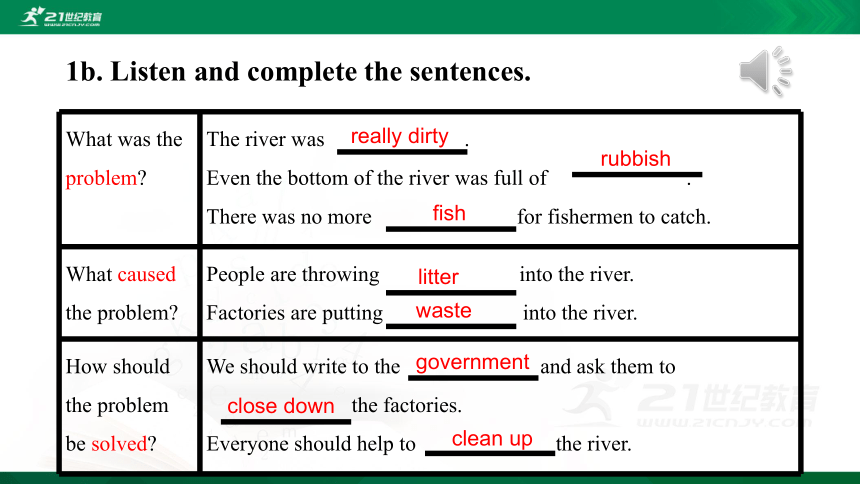

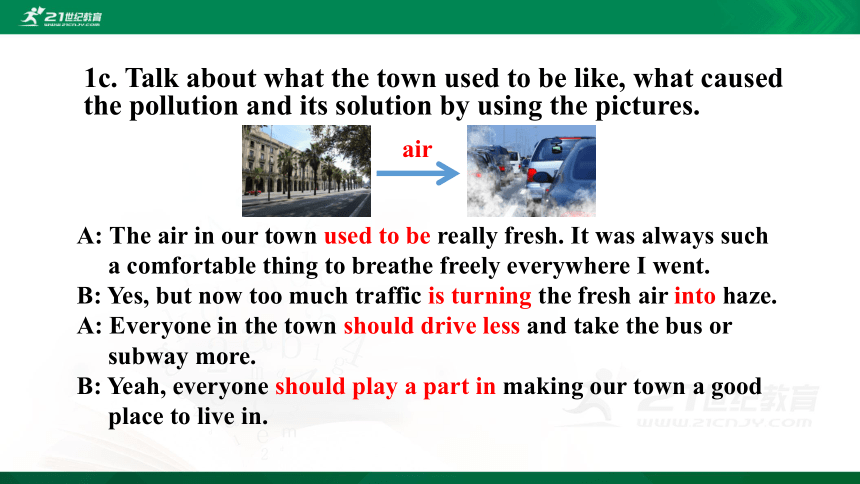
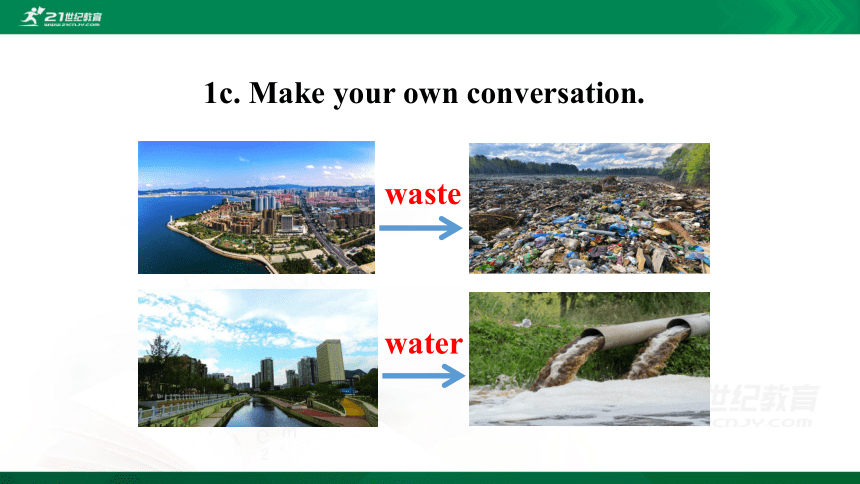
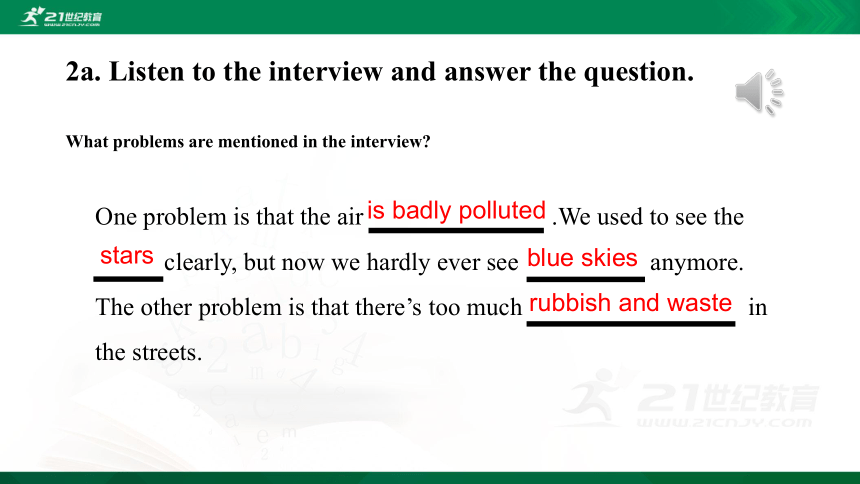
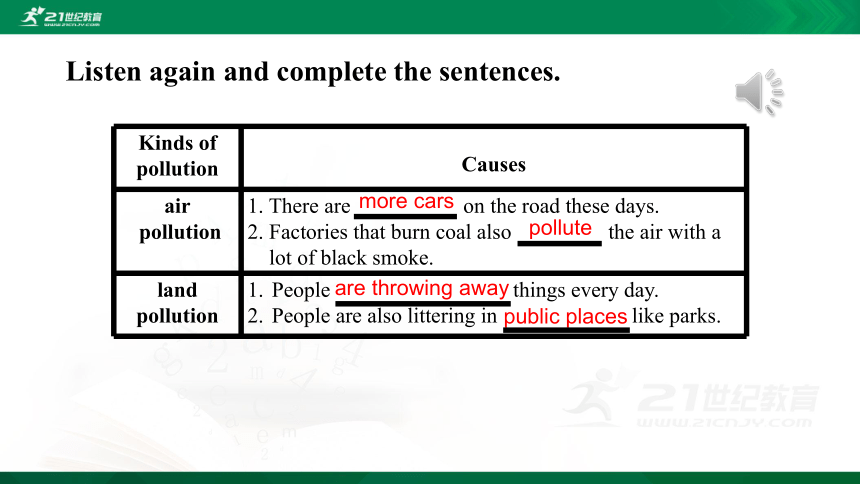
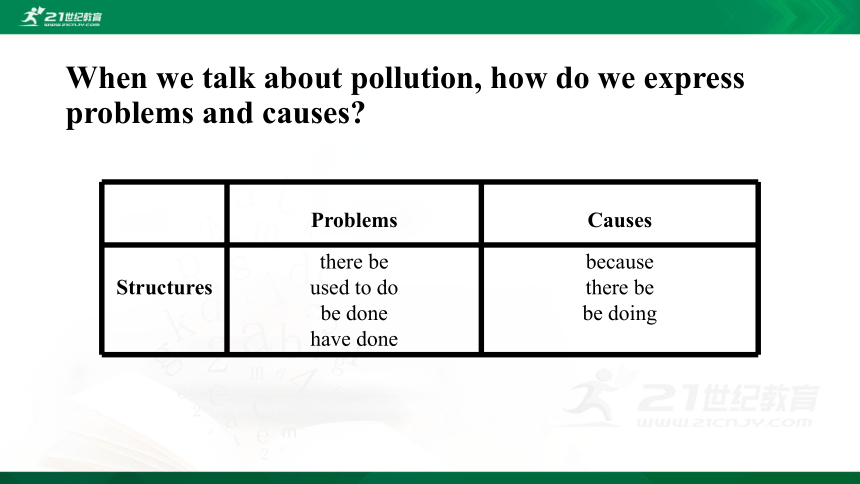
文档简介
Unit 13 We’re trying to
save the earth!
Section A(1a-2d)
Learning goals
At the end of this period, you’ll be able to
1. learn words and expressions about pollution and environmental
protection;
2. summarize and talk about pollution’s problems, causes and solutions.
What can you see in the pictures?
What kind of pollution are they?
air pollution
water pollution
land/waste/soil pollution
noise pollution
What kind of pollution are they talking about?
air pollution
water pollution
land/waste/soil pollution
noise pollution
{5940675A-B579-460E-94D1-54222C63F5DA}What was the problem?
The river was .
Even the bottom of the river was full of .
There was no more for fishermen to catch.
What caused the problem?
People are throwing into the river.
Factories are putting into the river.
How should the problem be solved?
We should write to the and ask them to
the factories.
Everyone should help to the river.
1b. Listen and complete the sentences.
really dirty
rubbish
fish
litter
waste
government
close down
clean up
{5940675A-B579-460E-94D1-54222C63F5DA}
The river was .
Even the bottom of the river was full of .
There was no more for fishermen to catch.
People are throwing into the river.
Factories are putting into the river.
We should write to the and ask them to
the factories.
Everyone should help to the river.
From what aspects are they talking about the problem?
really dirty
rubbish
fish
government
close down
clean up
Problems
Causes
Solutions
litter
waste
A: The air in our town used to be really fresh. It was always such
a comfortable thing to breathe freely everywhere I went.
B: Yes, but now too much traffic is turning the fresh air into haze.
A: Everyone in the town should drive less and take the bus or
subway more.
B: Yeah, everyone should play a part in making our town a good
place to live in.
air
1c. Talk about what the town used to be like, what caused the pollution and its solution by using the pictures.
water
waste
1c. Make your own conversation.
2a. Listen to the interview and answer the question.
What problems are mentioned in the interview?
One problem is that the air .We used to see the
clearly, but now we hardly ever see anymore. The other problem is that there’s too much in the streets.
is badly polluted
stars
blue skies
rubbish and waste
Listen again and complete the sentences.
are throwing away
more cars
pollute
public places
{5C22544A-7EE6-4342-B048-85BDC9FD1C3A}Kinds of pollution
Causes
air
pollution
1. There are on the road these days.
2. Factories that burn coal also the air with a
lot of black smoke.
land pollution
People things every day.
People are also littering in like parks.
When we talk about pollution, how do we express problems and causes?
{5C22544A-7EE6-4342-B048-85BDC9FD1C3A}
Problems
Causes
Structures
there be
used to do
be done
have done
because
there be
be doing
Retell the conversation with given information.
{5C22544A-7EE6-4342-B048-85BDC9FD1C3A}Problems
Causes
air / be badly polluted / used to / stars / blue skies
more cars /
factories / burn coal / black smoke
there is / rubbish and waste
throw away/ every day /
litter / public places
Jason and Susan are talking about some environmental problems they’ve seen ...
…
These are serious problems for our environment.
Jason and Susan are talking about some environmental problems they have seen.
One problem is that the air is badly polluted. We used to see the stars clearly, but now we hardly ever see blue skies anymore. One reason is that there are more cars on the road these days. It’s also because factories that burn coal pollute the air with a lot of black smoke.
The other problem is that there is too much rubbish and waste in the streets. It’s because people are throwing away things every day. And people are also littering in public places like parks.
These are serious problems for our environment.
Sample
2d. Listen and fill in the blanks.
{5940675A-B579-460E-94D1-54222C63F5DA}Kinds of pollution
Ideas for solving the problems
Air pollution
1. Take the or instead of .
2. .
Waste pollution
1. while going shopping.
2. Never take or plastic forks while
buying .
3. Throw rubbish and keep public places
and .
subway
driving
bus
Ride a bike
Bring a bag
wooden chopsticks
takeaway food
in the bins
clean
beautiful
Role-play the conversation.
Interviewer: Jason and Susan, what are your ideas for solving these
problems?
Jason: Well, to cut down air pollution, we should take the bus
or subway instead of driving.
Susan: Yeah, or ride a bike. These are other advantages of bike
riding. It’s good for health and it doesn’t cost anything!
Interviewer: Great ideas! What about waste pollution?
Susan: Mmm, I think simple things like bringing a bag to go
shopping can help. I started doing that a year ago.
Role-play the conversation.
Jason: Me, too. Also, I never take wooden chopsticks or plastic
forks when I buy takeaway food. I use the ones at home.
Susan: And remember to throw rubbish in the bins and keep
public places clean and beautiful for everyone.
Interviewer: So together, our actions can make a difference and lead
to a better future!
{5C22544A-7EE6-4342-B048-85BDC9FD1C3A}
Solutions
Structures
We should do sth. instead of doing sth.
Simple things like doing sth. can help.
Never do sth.
Remember to do sth.
It’s a good idea to do sth.
It’s a great idea that + sentence.
…
When we talk about pollution, how do we express solutions?
stop riding in cars
turn off the lights
when we leave a room
Things which can be done by people every day:
Things which can be done by people every day:
turn off the shower while we are washing our hair
recycle books and paper
Things which have to be done by governments and organizations:
1. educate the public
2. ensure that factories get rid of waste in a responsible way
3. preserve the forests
4. preserve endangered species
5. not allow activities that seriously endanger the environment
1c. Listen and check the things that Julia and Jack talk about.
1d. Listen and check the things that Julia is doing now, the things
she will do and the things she would never do.
Discuss questions.
1. Why does Julia refuse to do a few things?
Because they may cause inconvenience.
2. How can we be really serious about saving the earth?
To be really serious about saving the earth, we need to know the
consequences of our actions, or lack of action, and be prepared to
put the greater good before our personal needs.
Imagine that you are an ambassador of environmental protection in your community. Please give a speech on an environmental problem and its causes and solutions to call on people to take action.
Task
Sample
Dear neighbors,
Our neighborhood produces a lot of rubbish every day, such as leftover food, waste food and plastic bottles, but not many people sort out the rubbish.
One reason is that some of us haven’t developed a good habit of rubbish sorting. It’s also because some people haven’t realized how serious the problem is.
To solve the problem, it is necessary for everyone to learn about the rules of how to sort out the rubbish and and put the rules into practice. What’s more, we can volunteer to guide and monitor our neighbors on how to do it properly.
Together our actions can make a difference. Let’s take action now.
Homework
Make a survey on behaviors that are not environmental-friendly in your school and give your advice on such behaviors.
No act of kindness, no matter how small, is ever wasted.
勿以善小而不为。
save the earth!
Section A(1a-2d)
Learning goals
At the end of this period, you’ll be able to
1. learn words and expressions about pollution and environmental
protection;
2. summarize and talk about pollution’s problems, causes and solutions.
What can you see in the pictures?
What kind of pollution are they?
air pollution
water pollution
land/waste/soil pollution
noise pollution
What kind of pollution are they talking about?
air pollution
water pollution
land/waste/soil pollution
noise pollution
{5940675A-B579-460E-94D1-54222C63F5DA}What was the problem?
The river was .
Even the bottom of the river was full of .
There was no more for fishermen to catch.
What caused the problem?
People are throwing into the river.
Factories are putting into the river.
How should the problem be solved?
We should write to the and ask them to
the factories.
Everyone should help to the river.
1b. Listen and complete the sentences.
really dirty
rubbish
fish
litter
waste
government
close down
clean up
{5940675A-B579-460E-94D1-54222C63F5DA}
The river was .
Even the bottom of the river was full of .
There was no more for fishermen to catch.
People are throwing into the river.
Factories are putting into the river.
We should write to the and ask them to
the factories.
Everyone should help to the river.
From what aspects are they talking about the problem?
really dirty
rubbish
fish
government
close down
clean up
Problems
Causes
Solutions
litter
waste
A: The air in our town used to be really fresh. It was always such
a comfortable thing to breathe freely everywhere I went.
B: Yes, but now too much traffic is turning the fresh air into haze.
A: Everyone in the town should drive less and take the bus or
subway more.
B: Yeah, everyone should play a part in making our town a good
place to live in.
air
1c. Talk about what the town used to be like, what caused the pollution and its solution by using the pictures.
water
waste
1c. Make your own conversation.
2a. Listen to the interview and answer the question.
What problems are mentioned in the interview?
One problem is that the air .We used to see the
clearly, but now we hardly ever see anymore. The other problem is that there’s too much in the streets.
is badly polluted
stars
blue skies
rubbish and waste
Listen again and complete the sentences.
are throwing away
more cars
pollute
public places
{5C22544A-7EE6-4342-B048-85BDC9FD1C3A}Kinds of pollution
Causes
air
pollution
1. There are on the road these days.
2. Factories that burn coal also the air with a
lot of black smoke.
land pollution
People things every day.
People are also littering in like parks.
When we talk about pollution, how do we express problems and causes?
{5C22544A-7EE6-4342-B048-85BDC9FD1C3A}
Problems
Causes
Structures
there be
used to do
be done
have done
because
there be
be doing
Retell the conversation with given information.
{5C22544A-7EE6-4342-B048-85BDC9FD1C3A}Problems
Causes
air / be badly polluted / used to / stars / blue skies
more cars /
factories / burn coal / black smoke
there is / rubbish and waste
throw away/ every day /
litter / public places
Jason and Susan are talking about some environmental problems they’ve seen ...
…
These are serious problems for our environment.
Jason and Susan are talking about some environmental problems they have seen.
One problem is that the air is badly polluted. We used to see the stars clearly, but now we hardly ever see blue skies anymore. One reason is that there are more cars on the road these days. It’s also because factories that burn coal pollute the air with a lot of black smoke.
The other problem is that there is too much rubbish and waste in the streets. It’s because people are throwing away things every day. And people are also littering in public places like parks.
These are serious problems for our environment.
Sample
2d. Listen and fill in the blanks.
{5940675A-B579-460E-94D1-54222C63F5DA}Kinds of pollution
Ideas for solving the problems
Air pollution
1. Take the or instead of .
2. .
Waste pollution
1. while going shopping.
2. Never take or plastic forks while
buying .
3. Throw rubbish and keep public places
and .
subway
driving
bus
Ride a bike
Bring a bag
wooden chopsticks
takeaway food
in the bins
clean
beautiful
Role-play the conversation.
Interviewer: Jason and Susan, what are your ideas for solving these
problems?
Jason: Well, to cut down air pollution, we should take the bus
or subway instead of driving.
Susan: Yeah, or ride a bike. These are other advantages of bike
riding. It’s good for health and it doesn’t cost anything!
Interviewer: Great ideas! What about waste pollution?
Susan: Mmm, I think simple things like bringing a bag to go
shopping can help. I started doing that a year ago.
Role-play the conversation.
Jason: Me, too. Also, I never take wooden chopsticks or plastic
forks when I buy takeaway food. I use the ones at home.
Susan: And remember to throw rubbish in the bins and keep
public places clean and beautiful for everyone.
Interviewer: So together, our actions can make a difference and lead
to a better future!
{5C22544A-7EE6-4342-B048-85BDC9FD1C3A}
Solutions
Structures
We should do sth. instead of doing sth.
Simple things like doing sth. can help.
Never do sth.
Remember to do sth.
It’s a good idea to do sth.
It’s a great idea that + sentence.
…
When we talk about pollution, how do we express solutions?
stop riding in cars
turn off the lights
when we leave a room
Things which can be done by people every day:
Things which can be done by people every day:
turn off the shower while we are washing our hair
recycle books and paper
Things which have to be done by governments and organizations:
1. educate the public
2. ensure that factories get rid of waste in a responsible way
3. preserve the forests
4. preserve endangered species
5. not allow activities that seriously endanger the environment
1c. Listen and check the things that Julia and Jack talk about.
1d. Listen and check the things that Julia is doing now, the things
she will do and the things she would never do.
Discuss questions.
1. Why does Julia refuse to do a few things?
Because they may cause inconvenience.
2. How can we be really serious about saving the earth?
To be really serious about saving the earth, we need to know the
consequences of our actions, or lack of action, and be prepared to
put the greater good before our personal needs.
Imagine that you are an ambassador of environmental protection in your community. Please give a speech on an environmental problem and its causes and solutions to call on people to take action.
Task
Sample
Dear neighbors,
Our neighborhood produces a lot of rubbish every day, such as leftover food, waste food and plastic bottles, but not many people sort out the rubbish.
One reason is that some of us haven’t developed a good habit of rubbish sorting. It’s also because some people haven’t realized how serious the problem is.
To solve the problem, it is necessary for everyone to learn about the rules of how to sort out the rubbish and and put the rules into practice. What’s more, we can volunteer to guide and monitor our neighbors on how to do it properly.
Together our actions can make a difference. Let’s take action now.
Homework
Make a survey on behaviors that are not environmental-friendly in your school and give your advice on such behaviors.
No act of kindness, no matter how small, is ever wasted.
勿以善小而不为。
同课章节目录
- Unit 1 How can we become good learners.
- Section A
- Section B
- Unit 2 I think that mooncakes are delicious!
- Section A
- Section B
- Unit 3 Could you please tell me where the restroom
- Section A
- Section B
- Unit 4 I used to be afraid of the dark.
- Section A
- Section B
- Unit 5 What are the shirts made of?
- Section A
- Section B
- Review of Units 1-5
- Unit 6 When was it invented?
- Section A
- Section B
- Unit 7 Teenagers should be allowed to choose their
- Section A
- Section B
- Unit 8 It must belong to Carla.
- Section A
- Section B
- Unit 9 I like music that I can dance to.
- Section A
- Section B
- Unit 10 You're supposed to shake hands.
- Section A
- Section B
- Review of Units 6-10
- Unit 11 Sad movies make me cry.
- Section A
- Section B
- Unit 12 Life is full of the unexpected
- Section A
- Section B
- Unit 13 We're trying to save the earth!
- Section A
- Section B
- Unit 14 I remember meeting all of you in Grade 7.
- Section A
- Section B
- Review of Units 11-14
